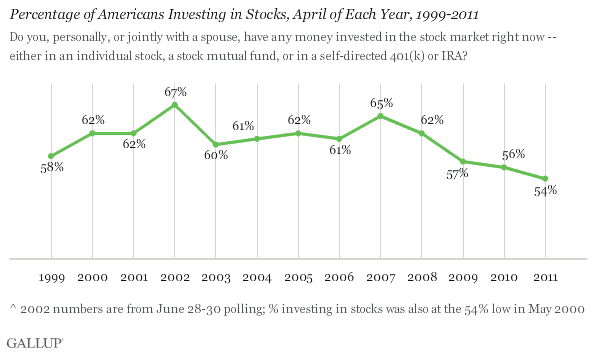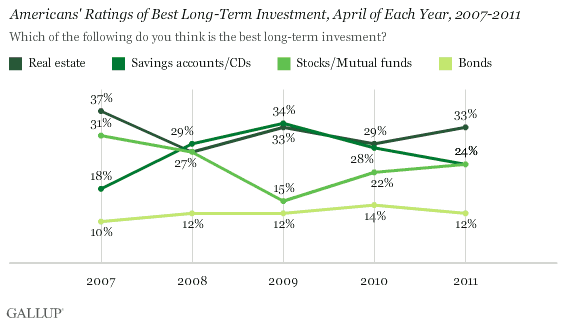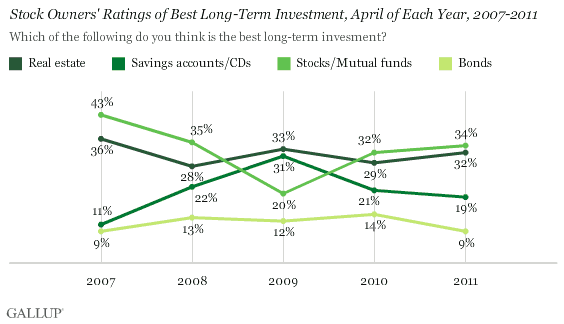PRINCETON, NJ -- Even as stocks have returned to lofty heights from their March 2009 lows, the percentage of Americans saying they hold individual stocks, stock mutual funds, or stocks in their 401(k) or IRA fell to 54% in April -- the lowest level since Gallup began monitoring stock ownership annually in 1999. Self-reported stock ownership has trended downward since 2007 -- before the recession and financial crisis began -- when 65% of Americans owned stocks.

Eighty-seven percent of upper-income Americans -- those making $75,000 or more annually -- own stocks, as do 83% of postgraduates and 73% of college graduates. Sixty-four percent of Republicans hold stocks, compared with half of Democrats and independents. Men are more likely than women to be stock owners. Those aged 50 to 64 are the most likely of any age group to say they have money invested in the stock market.
Real Estate Viewed as the Best Long-Term Investment
Although home prices are declining, foreclosures continue unabated, and residential real estate remains in a virtual depression, 33% of Americans say real estate is the best long-term investment out of the four choices offered. This is up from 29% a year ago, but below the pre-recession 37% in 2007.

Fewer Americans, one in four, point to stocks as the best long-term investment. Just as many say this about savings accounts and CDs, while 12% say bonds are the best investment. Prior to the recession and financial crisis, real estate and stocks were favored much more than savings accounts and bonds.
Although one in three stock owners see stocks as the best long-term investment -- a higher percentage than is the case for Americans overall -- essentially the same number think real estate fits this description, similar to opinions among all Americans.

Men are most likely to choose real estate over the other three as the best long-term investment, while women are evenly split between savings accounts and real estate. Younger people, college graduates and those with some college education, and upper-income Americans are more likely than their demographic counterparts to view real estate as the best long-term investment option. Those living in the West, where prices have been most depressed are more likely than those in the South and especially the Midwest to point to real estate as best. Republicans and independents tend to favor real estate more than Democrats do.
Implications
The financial crisis and the losses it produced for many investors have combined with government bailouts and Wall Street scandals to turn many Americans away from investing in stocks. Even as stocks have surged over the past couple of years, it has been hard for most Americans to understand what is happening on Wall Street and why, leaving them hesitant to invest in the stock market.
On the other hand, housing and real estate have also experienced sharp losses in recent years and show no signs of significant recovery; still, many Americans see real estate as the best investment for the long term. In part, this may be because depressed prices in the real estate sector make it a relatively attractive investment when investors hold it for the long term. It could also be that Americans feel more comfortable with and better understand real estate as an investment compared with stocks and Wall Street.
Wall Street has a long way to go to earn back the trust of the average American. Still, half of Americans continue to invest in stocks. Real estate and housing also face major trust issues. However, Americans' choice of real estate as the best long-term investment they can make today is good news for housing, homeowners, and all those associated with real estate.
Survey Methods
Results for this Gallup poll are based on telephone interviews conducted April 7-11, 2011, with a random sample of 1,077 adults, aged 18 and older, living in all 50 U.S. states and the District of Columbia.
For results based on the total sample of national adults, one can say with 95% confidence that the maximum margin of sampling error is ±4 percentage points.
For results based on the sample of 656 stock owners, the maximum margin of sampling error is ±5 percentage points.
Interviews are conducted with respondents on landline telephones and cellular phones, with interviews conducted in Spanish for respondents who are primarily Spanish-speaking. Each sample includes a minimum quota of 400 cell phone respondents and 600 landline respondents per 1,000 national adults, with additional minimum quotas among landline respondents for gender within region. Landline telephone numbers are chosen at random among listed telephone numbers. Cell phones numbers are selected using random digit dial methods. Landline respondents are chosen at random within each household on the basis of which member had the most recent birthday.
Samples are weighted by gender, age, race, Hispanic ethnicity, education, region, adults in the household, and phone status (cell phone-only/landline only/both, cell phone mostly, and having an unlisted landline number). Demographic weighting targets are based on the March 2010 Current Population Survey figures for the aged 18 and older non-institutionalized population living in U.S. telephone households. All reported margins of sampling error include the computed design effects for weighting and sample design.
In addition to sampling error, question wording and practical difficulties in conducting surveys can introduce error or bias into the findings of public opinion polls.
View methodology, full question results, and trend data.
For more details on Gallup's polling methodology, visit www.gallup.com.
